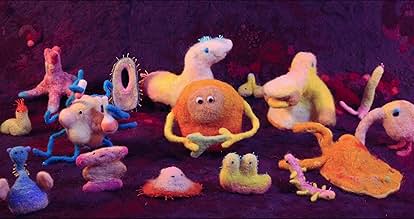À l'écoute du ventre : Les secrets de votre santé
Titre original : Hack Your Health: The Secrets of Your Gut
- 2024
- 1h 19min
NOTE IMDb
6,6/10
3 k
MA NOTE
Un documentaire informatif et léger qui explore les subtilités du système digestif et son rôle essentiel dans le maintien de la santé et du bien-être.Un documentaire informatif et léger qui explore les subtilités du système digestif et son rôle essentiel dans le maintien de la santé et du bien-être.Un documentaire informatif et léger qui explore les subtilités du système digestif et son rôle essentiel dans le maintien de la santé et du bien-être.
Heiner Krammer
- Self - Giulia's Mentor
- (as Dr. Heiner Krammer)
Kimmie Gilbert
- Self - Entrepreneur
- (as Kimmie 'Karma' Gilbert)
Takeru Kobayashi
- Self - World Champion Competitive Eater
- (as Takeru 'Kobi' Kobayashi)
Histoire
Commentaire à la une
The understanding of our gut health, as mentioned in the documentary, is gaining traction. So it's great to see ideas and studies being presented as they started rolling in.
However, these experts have to be wary that, since their goal is to inform and convince people of the facts that they've learned, they have to be very, very mindful about the boundaries between what are: i) facts (proven many times over), ii) likely scenarios (as shown by many promising correlations and results, but there are still many questions yet to be answered, and iii) personal hypotheses waiting to be put to test.
For example, when they're talking about bacteria giving us signals - what we should consume or not. I think that belongs to category ii) or iii) - more studies needed? It's terribly confusing, so should we give in to the signals? Nay (like the guy who says he doesn't want to because bread will make him gain weight) or yay (Enders or the guy who eats differently in China, not sure if he thinks it's entirely good or bad though). And speaking of the latter, I happened to live in East Asia and North America, alternatively, for a few years, the exact opposite happened? When I was in one region, I craved for things I couldn't get but was prevalent in another? So, perhaps it's psychological as well? What's the story here, don't throw things around like junk science when you've spent so many years making serious efforts. Some of the experts just spill things out like they're ironclad facts without any caveats (esp. Gilbert). It's self-sabotaging, really.
Then, there's the nutrition angle. I guess most of the experts here are not in this field, and diets are highly contextual... but haven't we established that red meat isn't that good? So for the woman who'd like to try a variety of foods, that's great, but why encouraged her to try pork/potato chip? If the goal is to "live life a little," then that should be said in a different way.
And as other commenters pointed out, it helps, tremendously, to put things in simple terms for the public. But that doesn't mean dumbing ideas down. You can present the general ideas, then go slightly deeper - without relying on inane illustrations - sometimes, most of us can handle the challenge, trust me.
"Hack" is an aggressive term, and it's not just irrelevant here, it may suggest something else entirely (think about hacking bros). So why used it? To make it more click-baity? Also, what happened to these people? Not even a short-term follow-up if they're doing/feeling better/worse? While it's great to have people with a variety of concerns here, but their concerns seem very disparate from one another? Yes yes, I know our gut is connected to our whole body and mind is the message being put forth here, but without a cohesive approach, it seems like they're just a bunch of people who have problems with food, and microbiome shouldn't necessarily be the main entryway for some of them, at least initially.
Lastly, we get it, we shouldn't treat poop as a kind of taboo... but honey, give us some time to get used to that idea? Why show such a long montage of the couple preparing poop? Goodness, we'll get the idea with just a short clip, it doesn't need to be SO literal.
However, these experts have to be wary that, since their goal is to inform and convince people of the facts that they've learned, they have to be very, very mindful about the boundaries between what are: i) facts (proven many times over), ii) likely scenarios (as shown by many promising correlations and results, but there are still many questions yet to be answered, and iii) personal hypotheses waiting to be put to test.
For example, when they're talking about bacteria giving us signals - what we should consume or not. I think that belongs to category ii) or iii) - more studies needed? It's terribly confusing, so should we give in to the signals? Nay (like the guy who says he doesn't want to because bread will make him gain weight) or yay (Enders or the guy who eats differently in China, not sure if he thinks it's entirely good or bad though). And speaking of the latter, I happened to live in East Asia and North America, alternatively, for a few years, the exact opposite happened? When I was in one region, I craved for things I couldn't get but was prevalent in another? So, perhaps it's psychological as well? What's the story here, don't throw things around like junk science when you've spent so many years making serious efforts. Some of the experts just spill things out like they're ironclad facts without any caveats (esp. Gilbert). It's self-sabotaging, really.
Then, there's the nutrition angle. I guess most of the experts here are not in this field, and diets are highly contextual... but haven't we established that red meat isn't that good? So for the woman who'd like to try a variety of foods, that's great, but why encouraged her to try pork/potato chip? If the goal is to "live life a little," then that should be said in a different way.
And as other commenters pointed out, it helps, tremendously, to put things in simple terms for the public. But that doesn't mean dumbing ideas down. You can present the general ideas, then go slightly deeper - without relying on inane illustrations - sometimes, most of us can handle the challenge, trust me.
"Hack" is an aggressive term, and it's not just irrelevant here, it may suggest something else entirely (think about hacking bros). So why used it? To make it more click-baity? Also, what happened to these people? Not even a short-term follow-up if they're doing/feeling better/worse? While it's great to have people with a variety of concerns here, but their concerns seem very disparate from one another? Yes yes, I know our gut is connected to our whole body and mind is the message being put forth here, but without a cohesive approach, it seems like they're just a bunch of people who have problems with food, and microbiome shouldn't necessarily be the main entryway for some of them, at least initially.
Lastly, we get it, we shouldn't treat poop as a kind of taboo... but honey, give us some time to get used to that idea? Why show such a long montage of the couple preparing poop? Goodness, we'll get the idea with just a short clip, it doesn't need to be SO literal.
- MeadtheMan
- 28 avr. 2024
- Permalien
Meilleurs choix
Connectez-vous pour évaluer et suivre la liste de favoris afin de recevoir des recommandations personnalisées
Détails
- Date de sortie
- Pays d’origine
- Langue
- Aussi connu sous le nom de
- Hack Your Health: The Secrets of Your Gut
- Sociétés de production
- Voir plus de crédits d'entreprise sur IMDbPro
- Durée1 heure 19 minutes
- Couleur
Contribuer à cette page
Suggérer une modification ou ajouter du contenu manquant

Lacune principale
What was the official certification given to À l'écoute du ventre : Les secrets de votre santé (2024) in Australia?
Répondre

































